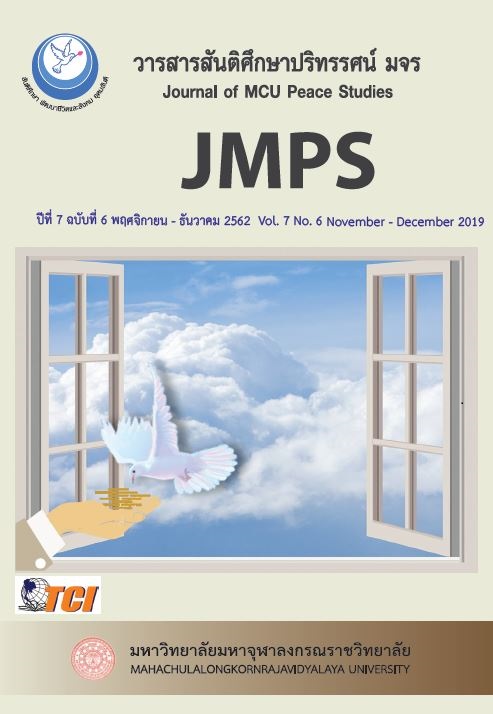การพัฒนาภาวะผู้นำการเปลี่ยนแปลงที่มีอิทธิพลต่อความสามารถทางการบัญชี ที่มีต่อความสำเร็จของธุรกิจโลจิสติกส์ในประเทศไทย
Main Article Content
บทคัดย่อ
การวิจัยครั้งนี้มีวัตถุประสงค์เพื่อ (1) สังเคราะห์ภาวะผู้นำการเปลี่ยนแปลงที่มีอิทธิพลต่อความสามารถทางการบัญชีที่มีต่อความสำเร็จของธุรกิจโลจิสติกส์ในประเทศไทย (2) ศึกษาความสัมพันธ์ภาวะผู้นำการเปลี่ยนแปลงที่มีอิทธิพลต่อความสามารถทางการบัญชีที่มีต่อความสำเร็จของธุรกิจโลจิกติกส์ในประเทศไทย (3) พัฒนาภาวะผู้นำการเปลี่ยนแปลงที่มีอิทธิพลต่อความสามารถทางการบัญชีที่มีต่อความสำเร็จของธุรกิจโลจิสติกส์ในประเทศไทย เป็นการวิจัยแบบผสมผสาน กลุ่มตัวอย่างคือ ผู้บริหารบริษัทรับจัดการขนส่งสินค้าระหว่างประเทศ จำนวน 142 คน และผู้บริหารบริษัทผู้ให้บริการโลจิสติกส์ ารโลจิสติกส์ ูลคือ ผู้ประกอบการจำนวน 20 คน โดยใช้แบบสอบถามและแบบสัมภาษณ์เป็นเครื่องมือเก็บรวบรวมข้อมูล สถิติที่ใช้วิเคราะห์ข้อมูล ได้แก่ สถิติเชิงพรรณนา สัมประสิทธิ์สหสัมพันธ์เพียร์สัน และการวิเคราะห์ถดถอยพหุคูณ
ผลการวิจัยพบว่า (1) ภาวะผู้นำการเปลี่ยนแปลง ประกอบด้วย ด้านความรู้ ด้านทักษะ ด้านคุณลักษณะส่วนบุคคล ด้านการปรับปรุงและเปลี่ยนแปลงอย่างต่อเนื่อง (2) ภาวะผู้นำการเปลี่ยนแปลงกับความสามารถทางการบัญชีมีความสัมพันธ์กันทางบวกอยู่ในระดับต่ำ (3) ภาวะผู้นำการเปลี่ยนแปลงมีอิทธิพลต่อผลการดำเนินธุรกิจโลจิสติกส์ อย่างมีนัยสำคัญทางสถิติที่ระดับ .01 ตัวแปรอิสระที่มีอำนาจในการทำนายอิทธิพลต่อผลการดำเนินธุรกิจโลจิสติกส์คือ ด้านอิทธิพลอุดมการณ์ ด้านการคำนึงถึงปัจเจกบุคคล ด้านการกระตุ้นการใช้ปัญญา และด้านการสร้างแรงบันดาลใจ ส่วนความสามารถทางการบัญชีมีอิทธิพลต่อผลการดำเนินธุรกิจโลจิสติกส์ อย่างมีนัยสำคัญทางสถิติที่ระดับ .05 ตัวแปรอิสระที่มีอำนาจในการทำนายอิทธิพลต่อผลการดำเนินธุรกิจโลจิสติกส์คือ ด้านระบบสารสนเทศทางการบัญชี ด้านความรู้การบัญชี ด้านจรรยาบรรณ และด้านทักษะการบัญชี
Article Details
ทัศนะและความคิดเห็นที่ปรากฏในบทความในวารสาร ถือเป็นความรับผิดชอบของผู้เขียนบทความนั้น และไม่ถือเป็นทัศนะและความรับผิดชอบของกองบรรณาธิการ ยินยอมว่าบทความเป็นลิขสิทธิ์ของวารสาร
เอกสารอ้างอิง
Bhatnagar, J. (2006). Measuring organizational learning capability in Indian managers and establishing firm performance linkage. The Learning Organization, 3(5), 416–633.
Boonyanet, W. ( 2016). Revenue Recognition in Accounting of Transportation and Logistics Businesses. Journal of Transportation and Logistics, 9(1), 96-108.
Chaipunha, S. Chaikidurajai, P., & Punpanich, N. (2016). The Structural Relationship Model of Knowledge Management to Learning Organization Organizational Agility and Competitive Advantage of Commercial Bank in Thailand. RMU Journal (Humanities and Social Sciences), 10(3), 89–104.
Charoenpornphom, P. (2015). The Relationship between Transformational Leadership, Work Engagement and Organizational Commitment: A Case Study of International Consumer Goods Company. Degree of Master of Arts, Thammasat University.
Daniela, P., & Attila, T. (2013). Internal audit versus internal control and coaching. Procedia Economics and Finance, 6(2), 694-702.
Department of Primary Industries and Mines. (2017). Industrial Logistics Performance Index Handbook. Logistics Service Information Center: LSIC. Mdicholding.
Habib, A., & Hossain, M. (2013). CEO/CFO Characteristics And Financial Reporting Quality: A review. Research in Accounting Regulation, 25(1), 88-100.
Jinain, P. & JeeraThanyasakul, S. (2018). Competitiveness Advantage of Plastic Industry. Journal of Suvannabhumi Institute of Technology Humanities and Social Sciences), 4(2), 257-270.
Latha, P. Boonlua, S., & et al. (2017). An Empirical Investigation of a Contingency Model of Integrated Performance Measurement System Strategy Evidence from Thai-Listed Firms. Degree of Doctoral of Accounting, Mahasarakham Business School.
Lekmat, L., & Intaragasam, P. (2019). Potential Development Guidelines of SMEs. University of the Thai Chamber of Commerce Journal Humanities and Social Sciences, 39(2). 104-122.
Office of the National Economic and Social Development Council. (2017). Thailand’s Logistics Report 2017. Retrieved December, 12, 2017, from https://www.nesdb.go.th.
Phanpanit, N. (2012). The Quantitative Relationship between Mckinsey 7S’s Model and Sustainable Competitive Advantage: Case study of Thai SMEs in Biotechnology Industry. APHEIT International Journal, 18(2), 70-79.
Pingpitthayakul, P. (2016). A Study of Competency of Logistics 4.0 Workforce by Using Quality Function Deployment (QFD) Method. Degree of Master of Science of Logistics and Supply Chain Management, Sripatum University.
Ritdech, A. (2014). Effects of the Accounting Knowledge, Accounting Information Systems, and Quality of Accounting Information on Earning the Beneficial Outcomes. Degree of Master of Accounting, Sripatum University.
Saengsuwanwow, N. (2017). Leaders and Public Sector Organization Change Under Thailand 4.0 Strategy. Phimoldhamma Research Institute Journal, 5(1), 67-78.
Sengpanich, U. (2015). The Utilization of Case Studies in Management Accounting Lessons to Improve the Knowledge of Applying Accounting Information for Management and Operation. Faculty of Management Science, Pibulsongkram Rajabhat University.
The Federation of Accounting Professions. (2015). Thai Accounting Standards. Retrieved September, 5, 2015, from http://www.tfac.or.th/Article/Detail/67362.
Thonjaroenkul, N. (2018). Accounting Staff Competencies Affecting the Effectiveness of Job Performance: A Case of Manufacturing Industry in Muang Samutprakarn District. APHEIT International Journal, 24(1), 58-70.
Wajeethongrattana, P. (2015). The Influence of Learning Efficiency toward Job Performance Effectiveness on Accountants in Nakhonratchasima Province. Journal of the Association of Researchers, 20(1), 85-94.
Watkins, K. E., & Marsick, V. J. (1993). Sculpting the Learning Organization Lessons in the Art and Science of Systemic Change. San Francisco: Jossey-Bass Publishers.
Watkins, C. (1985). The American Heritage Dictionary. (2nd ed.). Boston: Houghton Mifflin.


